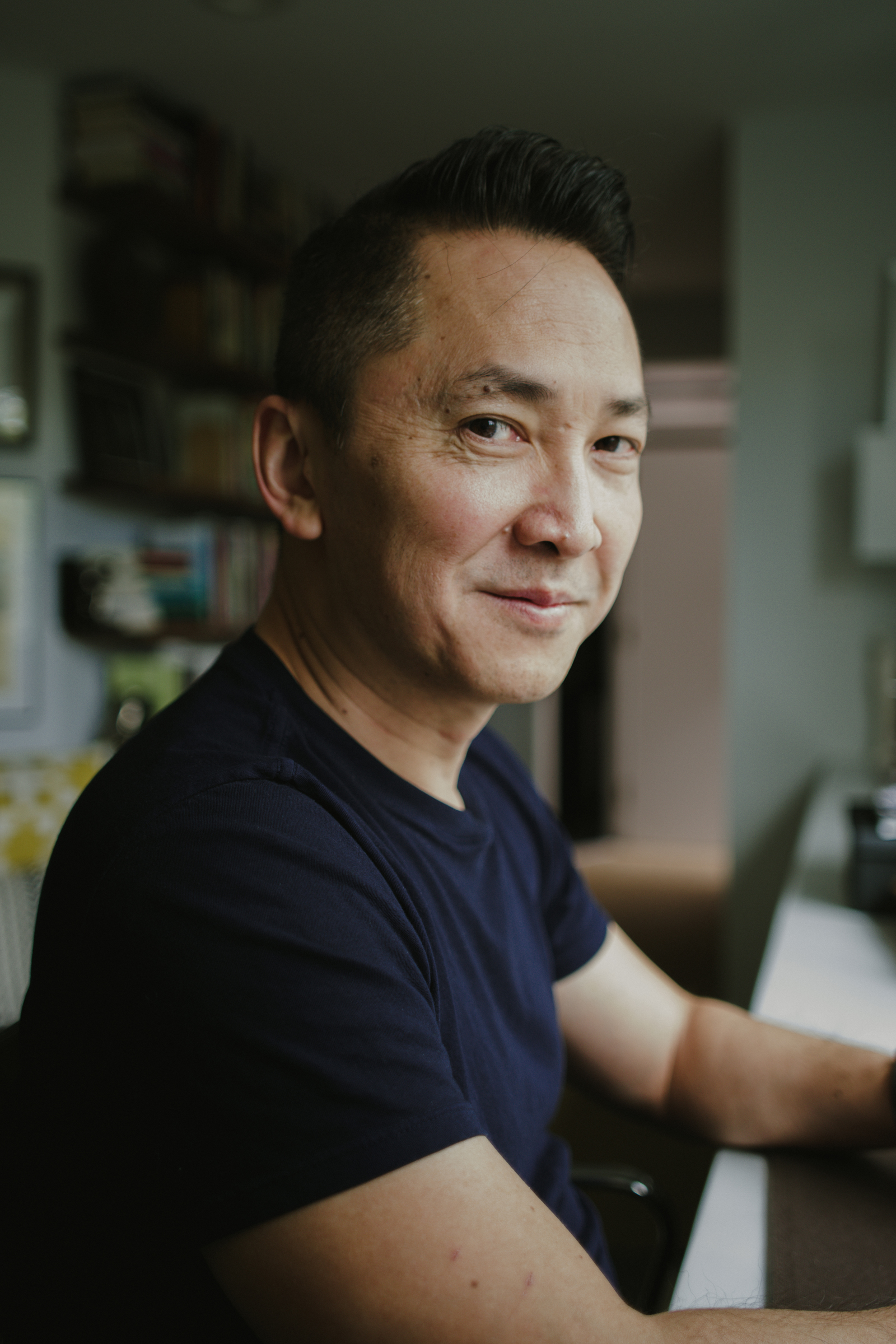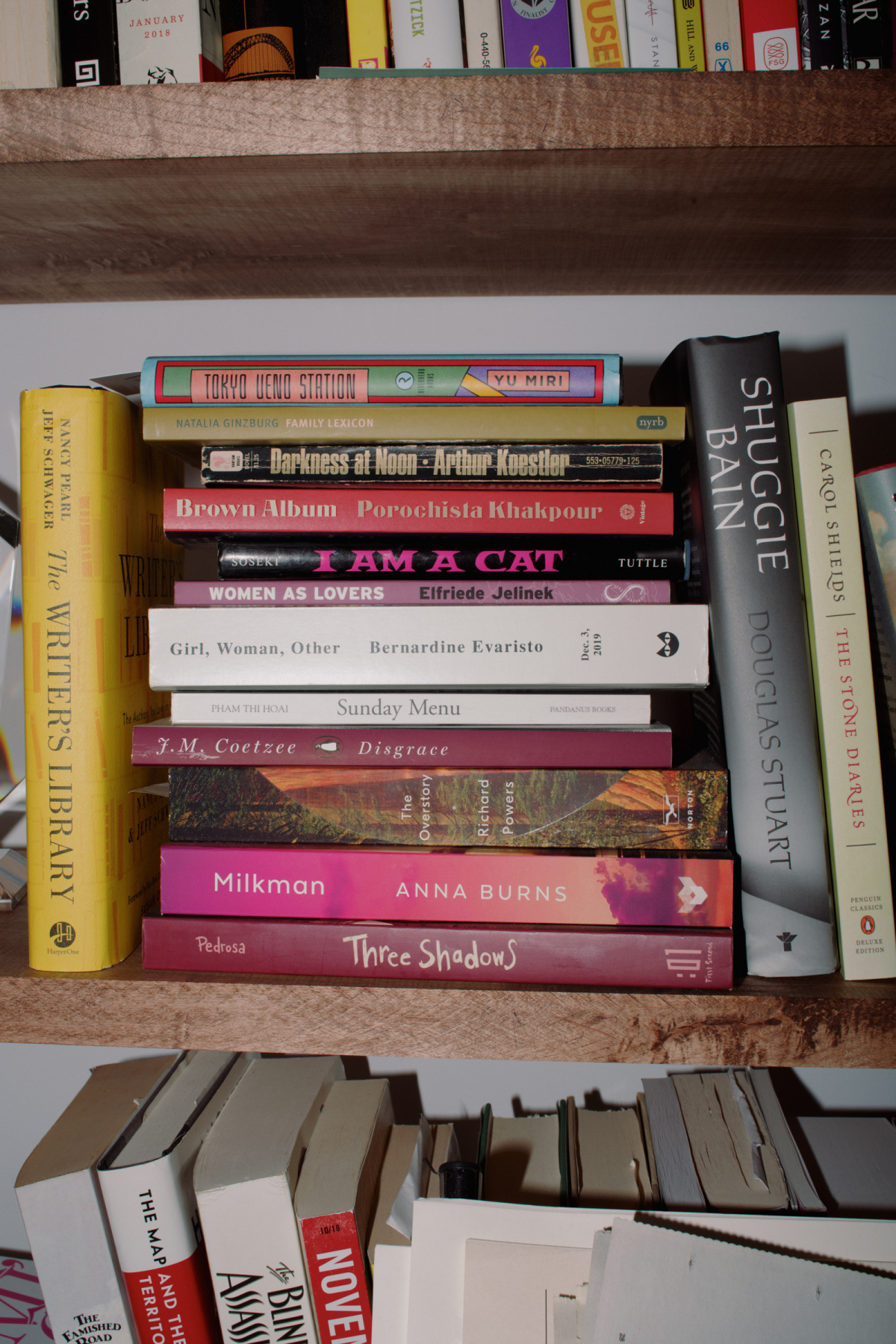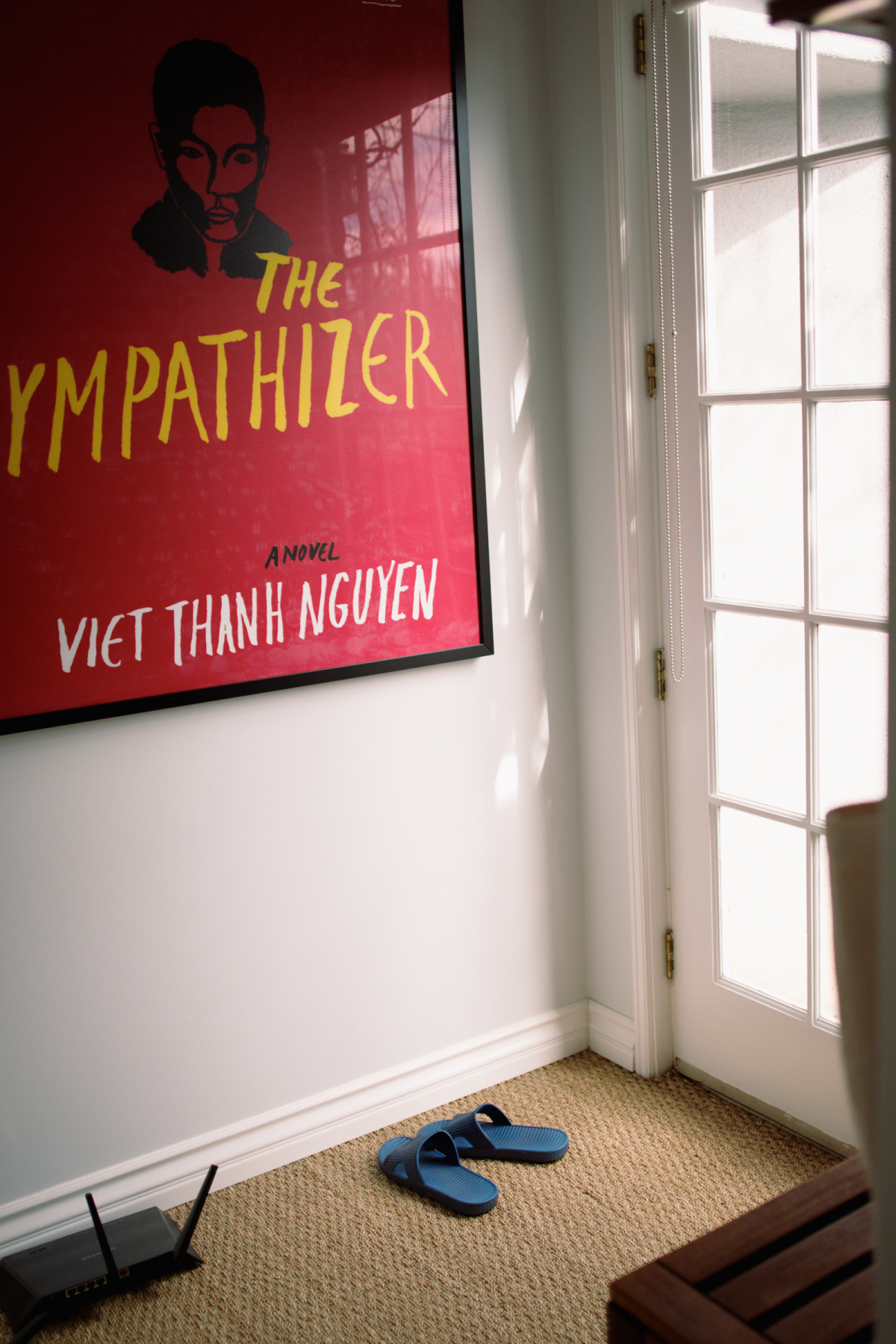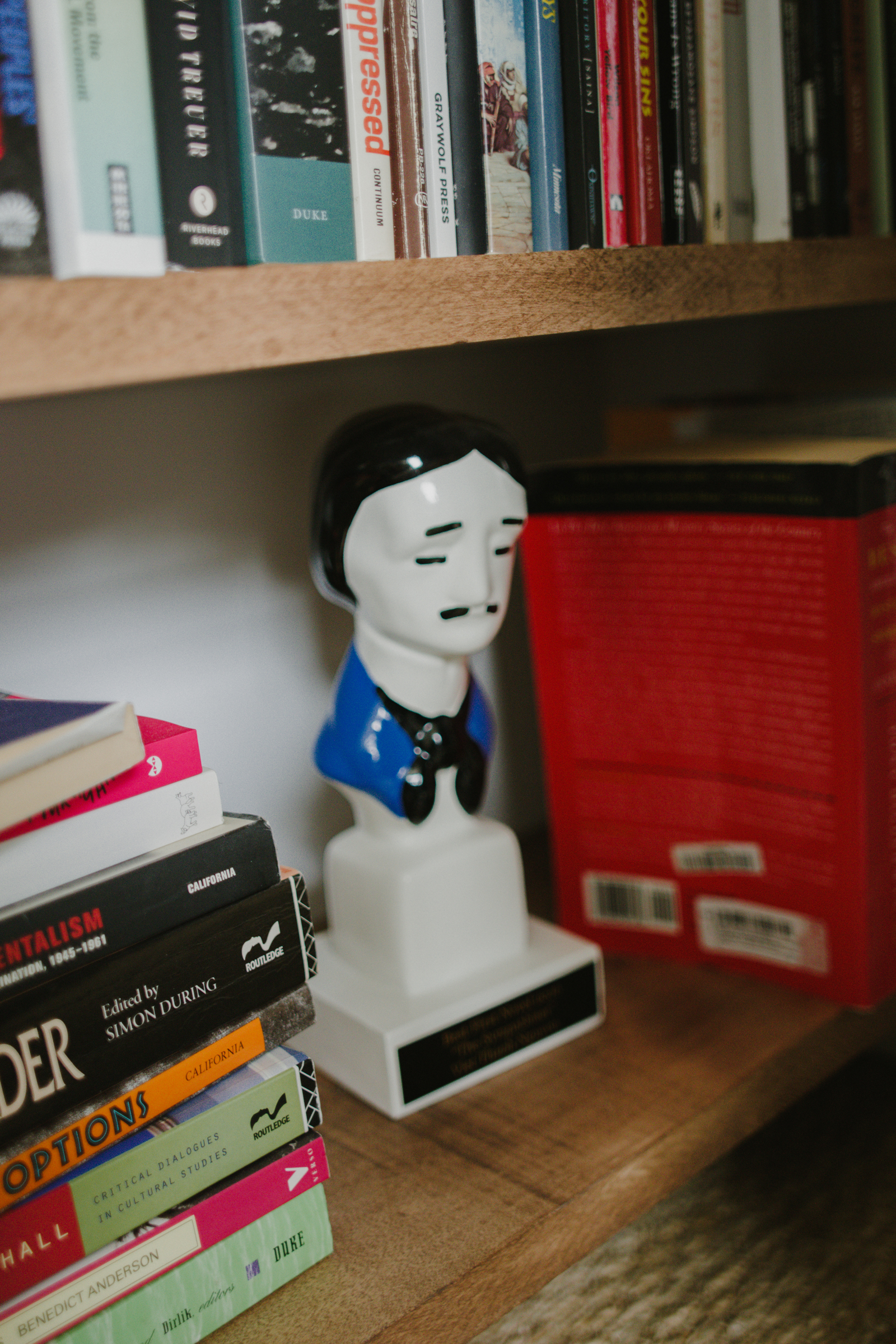“I’m stubborn, and I enjoy repetition.” That’s ultimately how author Viet Thanh Nguyen was able to take home the Pulitzer Prize, writing every day and trudging on for nearly 20 years even in the face of countless rejection letters (he got 13 in one day for what would ultimately win him that Pulitzer).
Repetition, or maybe it’s ritual, works for Viet. He wakes up every day and reads the news and emails in bed. He eats two slices of cinnamon raisin toast with a banana spread between them every morning. And then it’s time to head into his home office—teaching his USC students on Zoom, talking about Asian American literature or the Vietnam War. For lunch he has a salad. A few evenings a week, after quality time with his two young children, he unwinds with a cocktail—a martini with his wife at 5pm or, if he’s celebrating, a pour of Japanese whisky.
- Every day Viet commits to writing 1,000 words or writing for four hours—whichever comes first. When he’s on the road he takes notes in a Moleskin notebook or emails himself ideas for future projects. Photo by Chantal Anderson
- “It’s a real luxury to have this office, but as a writer I think the space is not important; the discipline is what’s important. Most of my life I wrote in a corner of my bedroom looking at a blank wall. No one wanted to take pictures of that,” Viet laughs. Photo by Chantal Anderson
Repetition feels good for Viet. He compares it to Haruki Murakami’s What I Talk About When I Talk About Running, a book that, at least in part, is about running every day. “The discipline of getting up to run every day is really crucial in the same way that getting up to write every day is really crucial,” he says. But while Haruki runs outdoors and trains for marathons, Viet runs on a treadmill. “I don’t mind the repetition. I eat the same food every single day two meals out of three. It doesn’t bother me. The act of writing is exactly like that. You do it over and over and over again. It would drive a lot of people crazy.”
Like marathons you train for, Viet says writing, too, is about endurance. “Talent is obviously important, but I think it’s less important than persistence and endurance,” he says. “I’m sure there are a lot of people out there with talent, but if they can’t sit in a room for 20 years and endure rejections they’re never going to become a writer. People with less talent who are more stubborn, who are more willing to sit there and endure and write, they have the potential to become writers.”
That was the process for Viet, who ultimately spent decades writing what he thought would be his first book, The Refugees (short stories), before finding it much easier to complete his Pulitzer-winning fiction debut, The Sympathizer. “A lot of writers go to MFA programs and learn the craft of writing there.” Viet didn’t have time for an MFA, instead juggling family and working as an academic at the University of Southern California. “I had to teach myself through trial and error how to write short stories, which in the end were not my natural form.”
- While Viet didn’t grow up owning any books that weren’t for school, he developed a fondness for the library early on. Now he’s surrounded by books in his house. “I’ve accumulated a lot for myself, but I’ve also made it a point to give my children a lot of books.” Photo by Chantal Anderson
- Viet lived in LA’s hip Silver Lake neighborhood for 20 years before starting a family and moving with his wife, also a professor and writer, to a quieter suburban neighborhood. “It’s beautiful with lots of trees and places to walk. It’s been a real lifesaver during the pandemic, probably literally.” Photo by Chantal Anderson
For 11 years Viet struggled to write The Refugees before hitting pause to try his hand at something else—his now Pulitzer-winning novel about identity, loyalty, and betrayal that came out in 2015. It took him just two years to complete. “I’d never written a novel before. When I sat down to write it all of a sudden I could write. Unconsciously, this hammering away of the short story form had taught me something about writing a larger form that I hadn’t realized.” The Refugees finally came out in 2017.
Most recently, The Committed, the much-anticipated sequel to The Sympathizer, hit shelves in March 2021. A third novel in what Viet calls The Sympathizer trilogy is currently in the works in Viet’s head (and probably in his computer in the form of many notes he’s emailed to himself). He’s currently working on a book of nonfiction.
Over those many years Viet kept an Excel sheet of rejections. While he hasn’t looked at it in a very long time, he’s sure it’s in the hundreds. “It’s important to share these stories. There isn’t a magical number of rejections because 12 or 14 could become 100. At what point do you stop and give up? I don’t put that number in my head. I think that would be wrong. It’s different for everybody, but what really matters is, again, your will. Do you feel like you can still do it? I never felt like I would quit.”
Still, some days were harder than others.
“I felt very disappointed sometimes. When The Sympathizer was rejected 13 times in one day, that was a really terrible day,” he says. “You’re allowed to feel bad, and you’re allowed to be disappointed, but everybody’s been through it at one point or another.”

Viet Thanh Nguyen. Photo by Chantal Anderson
Viet says getting up every day and writing is not just about the art of writing itself but about the spirituality of the craft. “I feel that if I hadn’t become a writer I would’ve done something else that requires all this effort. I would have become a chef or a gardener or a priest. These are vocations. You do these things for the beauty of what you’re doing, not necessarily for outside validation.”
Of course, it’s also nice to be validated, and having won the Pulitzer already takes the pressure off. “Many of us would like recognition and awards and readership and sales and royalties,” he says. “It’s all very important to pay the bills and to feel that your work is being read, but in the end it has nothing to do with the art of writing itself. It’s very difficult to detach the art of the writing from the reception. And I’m speaking from a position of luxury because I won the Pulitzer for The Sympathizer. So for me it’s like, ‘Oh, well I already got that,’ but I could want more, and maybe there are writers who feel that way. They get stuff and then they want more stuff.”
For Viet, though, while it would be nice to win more awards, he’s also content. “I’ve already gotten enough. That also allows me to walk away from some of these concerns.”
“I don’t want people’s expectations to affect my thinking about my own writing.”
Viet says he wrote The Sympathizer for himself and no one else, and that sentiment remained for The Committed, even though everyone was watching. “I knew when this novel came out there would be a lot of attention paid to it and the chances of it getting the same degree of reception The Sympathizer got was not going to be high.”
He remembers reading every single review, even on Goodreads, of his first novel, but this time around he’s avoided it, with a few exceptions. “I have not checked my sales rank. I don’t know what people are saying about this book,” he says. “It’s not that I worry about the Pulitzer; it’s that I don’t want people’s expectations to affect my thinking about my own writing.”
Viet says having kids (ages 7 and 1-and-a-half) has influenced his writing in ways he did not expect, taking him to new emotional depths (he didn’t really want to be a father at first) and opening him up to the world of children’s literature. “One of the writer’s primary resources is the capacity to feel, and to feel new things, and feel at a new depth, and I think I certainly learned that from being a parent.”
Reading to his kids has become a nighttime ritual he loves. “Children’s literature is changing. There’s the whole Dr. Seuss controversy right now, but that’s what we had growing up. Now children’s literature is so far beyond what I was exposed to.”
- In 2020 Viet read more than 90 books. Works like Don Mee Choi’s DMZ Colony and Layli Long Soldier’s Whereas are titles on his mind lately, as well as Claudia Rankine’s Just Us: An American Conversation. Photo by Chantal Anderson
- Inside Viet’s Pasadena, California home. Photo by Chantal Anderson
Viet says people who are upset about Dr. Seuss probably just don’t get it. “It’s not a cancellation of Dr. Seuss; it’s a grooming of his work to get rid of the worst stuff. My feeling is that those people who are upset about these kinds of things have never been subjected to these kinds of stereotypes and caricatures and outright racism. They don’t understand why it would be painful, especially for children, and that that can be damaging for children’s self-perception and how we as children normalize these things.”
But how to deal with those people who resent the loss of a half-dozen Dr. Seuss books no one ever read anyway? “What I think some people are resenting is why they can’t tell these kinds of jokes or draw these kinds of images anymore.” Viet’s question: Why do you need to?
He’s optimistic about what’s being written today, with a growing pool of diverse writers. One of his son’s favorite books features a boy named Alvin Ho, and Viet says the popularity of that series is invigorating. “Alvin Ho is a kid with a lot of allergies and hangups, and it’s funny, but the most important thing is that it normalizes even having a kid named Alvin Ho and his family in a series of books,” Viet says. “It’s cool to see that in the world of children’s literature there are more writers of color, queer writers, and all kinds of diverse communities being represented in really creative ways that demonstrate that you don’t have to demonize people in order to have fun.”
Another thing Viet loves about reading to the kids is how playful the authors can be. They break the rules, playing with formatting or making up words. It’s liberating, and some of that energy, Viet hopes, made its way into The Committed.
Every day Viet commits to putting 1,000 words on the page or doing four hours of writing, whichever comes first. In the evening, after he’s read to the kids and they’ve fallen asleep, his nighttime rituals begin. Tonight he’s probably reading one of the 90-plus books he reads each year as part of the Pulitzer Prize Board or working out in his home gym. Maybe he’s having a Negroni. He often stays up to 3 or 4 in the morning—he’s been a night owl since high school—even though he’ll still probably wake around 9:30 and do it all again.
“People who become writers often say they had no choice. They’ve been called to this,” he says. “I think sane people who can do something else, who can see another door, they take it because it’s hard to do this work. It’s not something I would advise people to do unless they feel a really deep compulsion to do it.”
A version of this article originally appeared in Sixtysix Issue 06 with the headline “Viet Thanh Nguyen: Author, Pasadena” Subscribe today.









